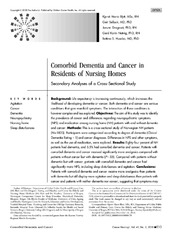| dc.contributor.author | Blytt, Kjersti Marie | en_US |
| dc.contributor.author | Selbæk, Geir | en_US |
| dc.contributor.author | Drageset, Jorunn | en_US |
| dc.contributor.author | Natvig, Gerd Karin | en_US |
| dc.contributor.author | Husebø, Bettina | en_US |
| dc.date.accessioned | 2018-03-15T14:12:19Z | |
| dc.date.available | 2018-03-15T14:12:19Z | |
| dc.date.issued | 2018 | |
| dc.Published | Blytt k, Selbæk GS, Drageset J, Natvig GK, Husebø BS. Comorbid Dementia and Cancer in Residents of Nursing Homes: Secondary Analyses of a Cross-Sectional Study. Cancer Nursing. 2018;41(2):E13-E20 | eng |
| dc.identifier.issn | 0162-220X | |
| dc.identifier.issn | 1538-9804 | |
| dc.identifier.uri | https://hdl.handle.net/1956/17522 | |
| dc.description.abstract | Background: Life expectancy is increasing continuously, which increases the likelihood of developing dementia or cancer. Both dementia and cancer are serious conditions that give manifold symptoms. The interaction of these conditions is however complex and less explored. Objectives: The aim of this study was to identify the prevalence of cancer and differences regarding neuropsychiatric symptoms (NPS) and medication among nursing home (NH) patients with and without dementia and cancer. Methods: This is a cross-sectional study of Norwegian NH patients (N = 1825). Participants were categorized according to degree of dementia (Clinical Dementia Rating > 1) and cancer diagnoses. Differences in NPS and other symptoms, as well as the use of medication, were explored. Results: Eighty-four percent of NH patients had dementia, and 5.5% had comorbid dementia and cancer. Patients with comorbid dementia and cancer received significantly more analgesics compared with patients without cancer but with dementia (P < .05). Compared with patients without dementia but with cancer, patients with comorbid dementia and cancer had significantly more NPS, including sleep disturbances and agitation. Conclusions: Patients with comorbid dementia and cancer receive more analgesics than patients with dementia but still display more agitation and sleep disturbances than patients with cancer and patients with neither dementia nor cancer, suggesting that symptoms may not be treated adequately. Implications for Practice: The results indicate a considerable strain for patients with comorbid dementia and cancer and highlight essential challenges for the clinician who is responsible for treatment and care. Nurses should pay attention to agitation and sleep disturbances among patients with comorbid dementia and cancer. | en_US |
| dc.language.iso | eng | eng |
| dc.publisher | Wolters Kluwer | eng |
| dc.rights | Attribution CC BY-NC-ND | eng |
| dc.rights.uri | http://creativecommons.org/licenses/by-nc-nd/4.0/ | eng |
| dc.subject | Agitation | eng |
| dc.subject | Cancer | eng |
| dc.subject | Dementia | eng |
| dc.subject | Neuropsychiatry | eng |
| dc.subject | Nursing home | eng |
| dc.subject | Sleep disturbances | eng |
| dc.title | Comorbid Dementia and Cancer in Residents of Nursing Homes: Secondary Analyses of a Cross-Sectional Study | en_US |
| dc.type | Peer reviewed | |
| dc.type | Journal article | |
| dc.date.updated | 2018-01-09T14:02:55Z | |
| dc.description.version | publishedVersion | en_US |
| dc.rights.holder | Copyright 2018 The Author(s) | |
| dc.identifier.doi | https://doi.org/10.1097/ncc.0000000000000478 | |
| dc.identifier.cristin | 1447460 | |
| dc.source.journal | Cancer Nursing | |

